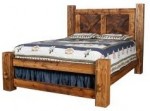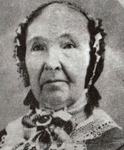Zion—or a feather bed?

Many Saints were migrating to Zion, which had been established in what is now known as “Utah.” So anxious were we all to join the Saints, that we were willing to accept any kind of transportation, to make the trip. Just at this time, the “Handcart Method” had been adopted and we were grateful for even this mode of transportation to travel. We expected the handcarts to be ready, but they were not. We were delayed in Iowa City. Handcarts had to be made, supplies gathered, oxen caught and broken to pull the heavy supply wagons, everything that even hinted of being a luxury, must be eliminated. There were many keepsakes that I wanted to take, but couldn’t. But there was one thing I didn’t consider a luxury and that was my feather-bed. I had hung onto that beloved item from the time of the auction in England and now clearly there was no room for it. It wouldn’t be bad to walk 1300 miles if one had a feather-bed to sleep on at night, but no matter how I folded it, it was too bulky. Wouldn’t it be just wonderful I thought, if I could deflate it in the morning and inflate it at night, so it would pack compactly. But a feather-bed is a feather-bed and when it came to choosing between Zion and a feather-bed, well it was a little too late to turn my back on Zion, so I ripped it open and emptied the feathers on the ground and used the tick to cover the supplies on the handcart.1
The above story about Ann Rowley, a Mormon pioneer who crossed the plains to Utah, in the well-known Willie handcart company in 1856, is widely circulated as being true although no known original copy has been found. This story has MANY principles – true principles as mentioned in scripture and told by prophets today; principles which if we adhere to will also benefit us.
It hurt me to see my children go hungry. I watched as they cut the loose rawhide from the cart wheels, roast off the hair and chew the hide.One such principle is “…ye receive no witness until after the trial of your faith.” (Ether 12:6) How was Ann Rowley’s faith tried? In a practical way, it was her desire to be in Zion versus her featherbed! And she chose Zion. And her “witness?” Many days later on the trail she received it. Here is her story:

There came a time, when there seemed to be no food at all. Some of the men left to hunt buffalo. Night was coming and there was no food for the evening meal. I asked God’s help as I always did. I got on my knees, remembering two hard sea biscuits that were still in my trunk. They had been left over from the sea voyage, they were not large, and were so hard, they couldn’t be broken. Surely, that was not enough to feed 8 people, but 5 loaves and 2 fishes were not enough to feed 5000 people either, but through a miracle, Jesus had done it. So, with God’s help, nothing is impossible. I found the biscuits and put them in a dutch oven and covered them with water and asked for God’s blessing, then I put the lid on the pan and set it on the coals. When I took off the lid a little later, I found the pan filled with food. I kneeled with my family and thanked God for his goodness. That night my family had sufficient food. 2
Now I do not tell this story to make those with similar trials feel badly because they don’t receive any later witness. There are many stories of people who have faith, who persevere, and work hard, but still have no witness. This story and others like it are told to illustrate that the “purpose” or principle of the story is not in the reward but is in the trial. Remember Job? Your faith should not be dependent on a reward. But is it?
One of the sayings I love and use all the time to guide my life is “Do the RIGHT thing, for the RIGHT reasons, REGARDLESS of the consequences.” The consequences could be good or bad – but that doesn’t matter. We love it when the consequences are good, like Ann Rowley’s story, and it buoys us up for the future. But if the consequences are bad, would that affect your faith in the future? Would you doubt? In answering this question, think of the way two prophets left this life—Elijah and John the Baptist. The first was glorious, the second was beheaded. Did one or the other “deserve” his ending more because his faith was greater or less than the other? No!
Therefore, the message of this thought is to show the purpose of the trial of OUR faith is different from others. Were there others in Ann Rowley’s handcart company who did not have food while Ann Rowley’s family got the biscuits? Yes. Did they have less faith than Ann Rowley? Probably not. We know other stories from the same pioneers tell us about miracles happening to some and not to others.
Just because we exercise our faith good consequences won’t necessarily follow. All spiritual manifestations are the will of our Father in heaven. Could it be that Ann Rowley had this experience because God knew she would later relate it so that we could have it today as an example of faith under trial? It not only benefited her, but also benefits us. The exercise of our faith is the important part of the “faith = reward” equation. It is the trial we must pass, regardless of the consequences, that determines our spiritual standing.
Footnotes 1 & 2: Some Early Pioneers of Huntington, Utah and Surrounding Area (1980), and Ann Rowley, in Andrew D. Olsen, The Price We Paid: The Extraordinary Story of the Willie and Martin Handcart Pioneers (2006), 113.
Job 2:9,10; 13:15
James 1:2,12
1 Peter 1:7; 2:19,20
~Brother Bruce Barton
